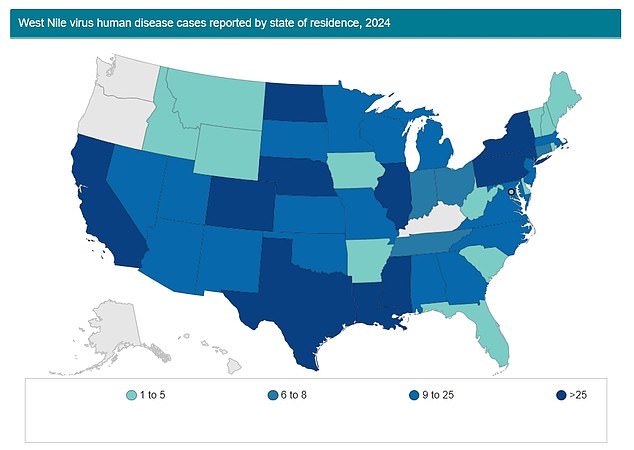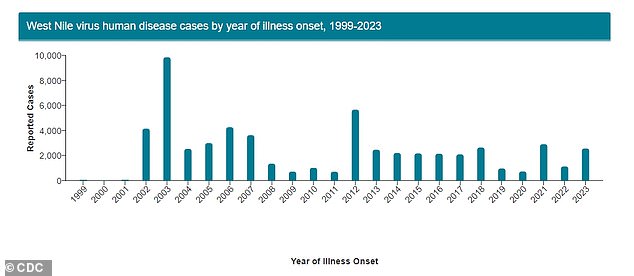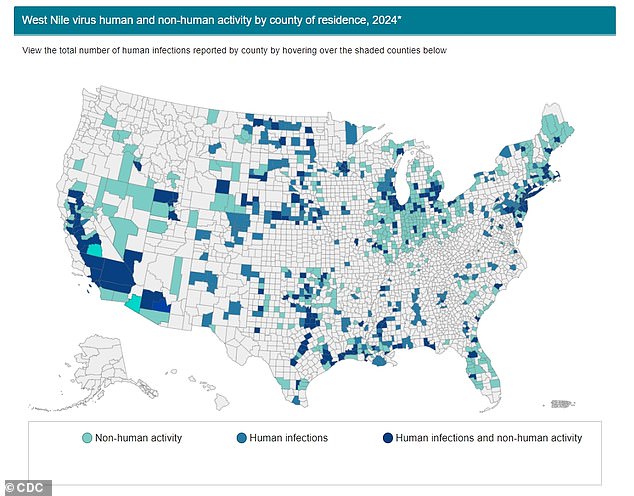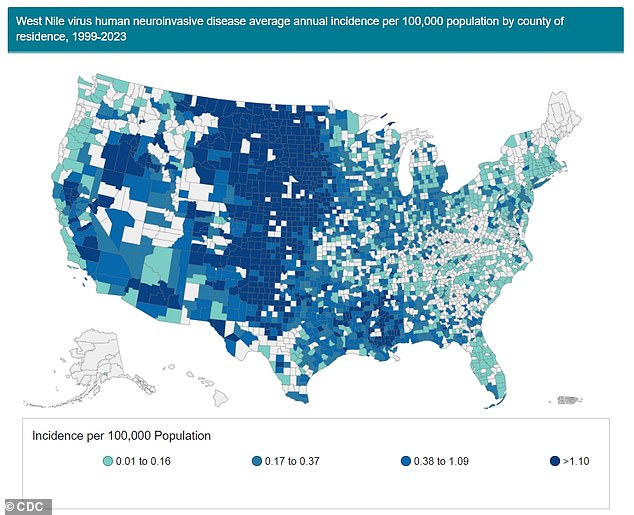Anthony Fauci reveals ‘harrowing’ near-death experience after contracting an incurable virus: ‘I couldn’t walk or think’
Dr. Anthony Fauci has revealed how he feared he would never recover after being hospitalized with the mosquito-borne West Nile virus.
The former White House doctor, 83, experienced weakness and fatigue that he blamed on a recent bout of Covid, but he soon became delirious and incoherent with a fever of 103 degrees.
He was admitted to the hospital where doctors were unable to determine what was causing Dr. Fauci, and while he doesn’t remember much, he does remember that he had “never felt so sick in my life.”
Only after he returned home did blood tests reveal that Dr. Fauci had been infected with West Nile virus, a potentially fatal mosquito-borne disease.
There is no vaccine or specific treatment for the virus, but 80 percent of cases are mild and patients may experience flu-like symptoms or rashes, but in more severe cases, patients may experience neuroinvasive West Nile disease, which can be fatal.
Anthony Fauci, former director of the National Institute of Allergy and Infectious Diseases, contracted West Nile virus but is expected to make a full recovery

The above shows where West Nile Virus has been detected in the United States
Dr. Fauci described his ‘harrowing’ experience contracting the West Nile virus in an August 2024 op-ed in the New York Times.
Dr. Fauci wrote, “There is no treatment for West Nile Virus disease, and I had to bear the toll on my body. It was terrifying. I couldn’t swing my legs over the side of the bed to sit up without help from my wife and three daughters.
‘I couldn’t get up without help and certainly couldn’t walk. A very frightening part of the ordeal was the effect on my cognition. I was disoriented, couldn’t remember certain words, and asked questions to my family that I should have known the answers to.
“I was afraid I would never recover and be back to normal.”
The former head of the National Institute of Allergy and Infectious Diseases had contracted Covid a month earlier and blamed the West Nile virus symptoms on rebound Covid symptoms, but his extreme fatigue and exhaustion, coupled with a dangerously high fever , took him to the hospital.
Doctors thought that Dr. Fauci had sepsis, a life-threatening overreaction of the immune system to an infection, and began treating him with antibiotics. Five days later his fever subsided and he went home.
The next day his blood results came back and they were positive for West Nile virus.

About 60,000 cases of West Nile virus have been reported in the U.S. since 1999

As of 2024, West Nile has been found in humans in 46 states
As of October 1, 880 cases of West Nile virus have been reported in 46 states, with 65 developing into the more serious neuroinvasive West Nile disease.
This life-threatening condition is rare (affecting less than one percent of West Nile patients) but can lead to high fever, disorientation, headache, stiffness, tremors, convulsions, paralysis, tremors, brain swelling and coma.
West Nile virus, which Dr. Fauci called an “emerging public health threat,” is the most common mosquito-borne disease in the U.S. and has caused nearly 3,000 deaths since it was first discovered in the U.S. in 1999.
Dr. Fauci wrote that his recovery was a slow process. When he arrived home, he was bedridden, disoriented, and unable to sit up.
A few weeks later he was able to walk with a walker. A few weeks later he was able to walk on his own and now he can walk several miles a day without experiencing exhaustion.
He added that his cognitive issues have been completely resolved and he is on the path to a full recovery.
Dr. Fauci wrote for the Times: “I’m telling my story because the West Nile virus is a disease that could have devastating and lasting consequences for many people. At 83, I was at risk of permanent neurological damage and even death. Yet the public may not be aware of the danger of this disease and the fact that it continues to spread across the United States.”
The virus was first discovered in the US in the New York City area in 1999 and was likely introduced from the Middle East or Africa. Mosquitoes get the virus from infected birds and pass it on to humans through a bite.
And experts say global warming caused by climate change will only increase the incidence of West Nile in the U.S. because mosquitoes are attracted to warm, humid climates and standing water.

The above shows where patients with West Nile virus developed the more severe neuroinvasive West Nile virus disease between 1999 and 2023
Despite this, Dr. Fauci said West Nile virus is not getting the funding and research it needs to find a vaccine or treatment because governments, research institutions and pharmaceutical companies do not want to spend money developing a vaccine or treatment , because the cases vary so widely. from year to year.
He wrote: ‘Such fluctuations make it virtually impossible to have a consistent enough number of cases to show that a vaccine was effective in preventing infection. The same frustration applies to the development of antiviral drugs.
“Because patient numbers are so inconsistent, pharmaceutical companies lack the financial incentive to make major investments in developing drugs and vaccines for West Nile.”
To solve this problem, Dr. Fauci said efforts for a vaccine and antiviral drugs must be a global collaboration between both public and private entities, as the efforts for HIV, hepatitis and Covid were.
He wrote: ‘With international research partnerships and political will, spurred on by a committed activist community as we have seen with HIV and now long Covid, West Nile virus treatments and prevention tools should be within our reach.’
